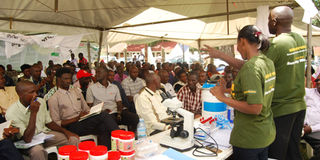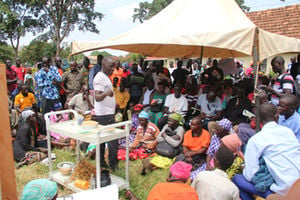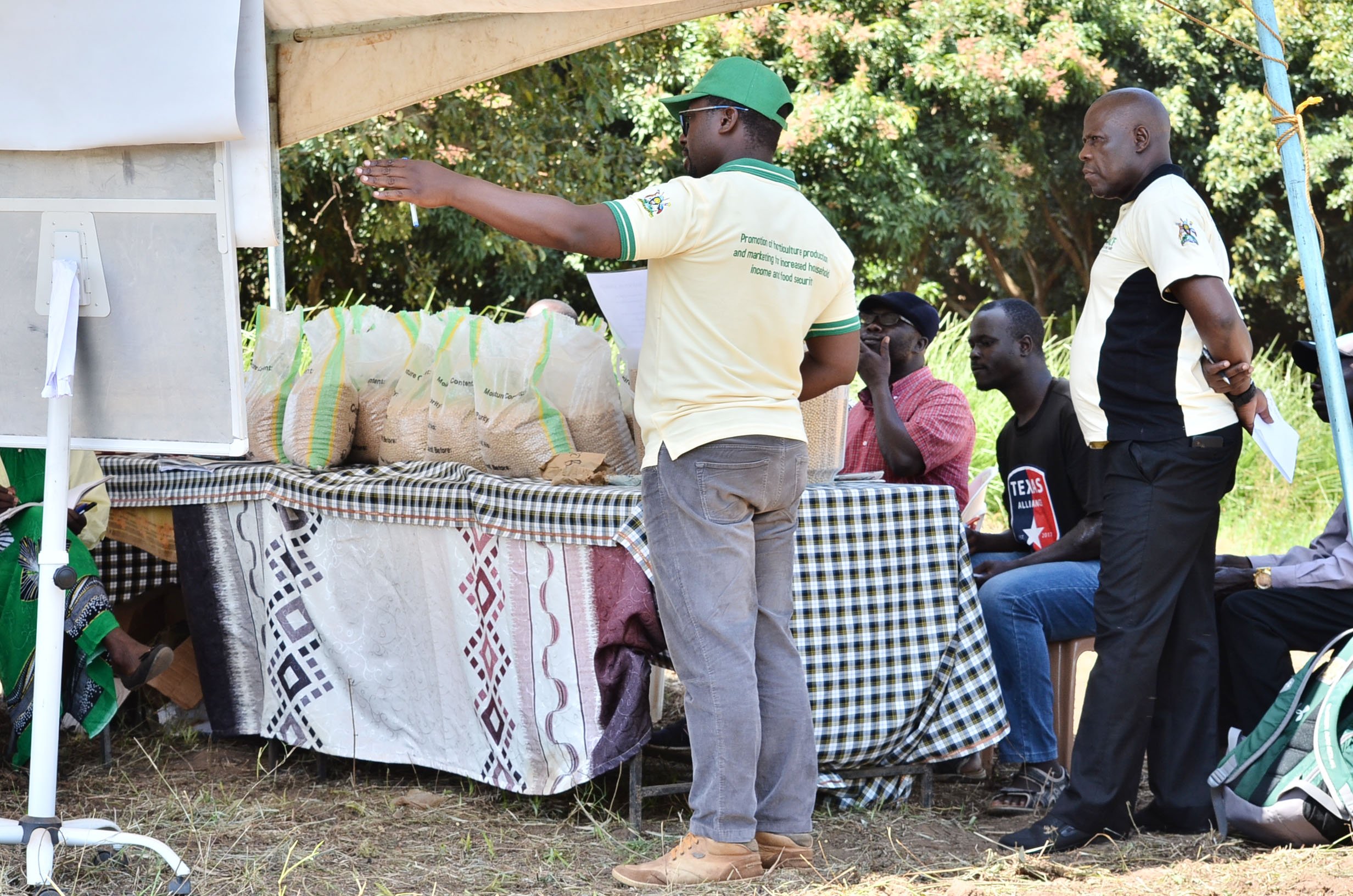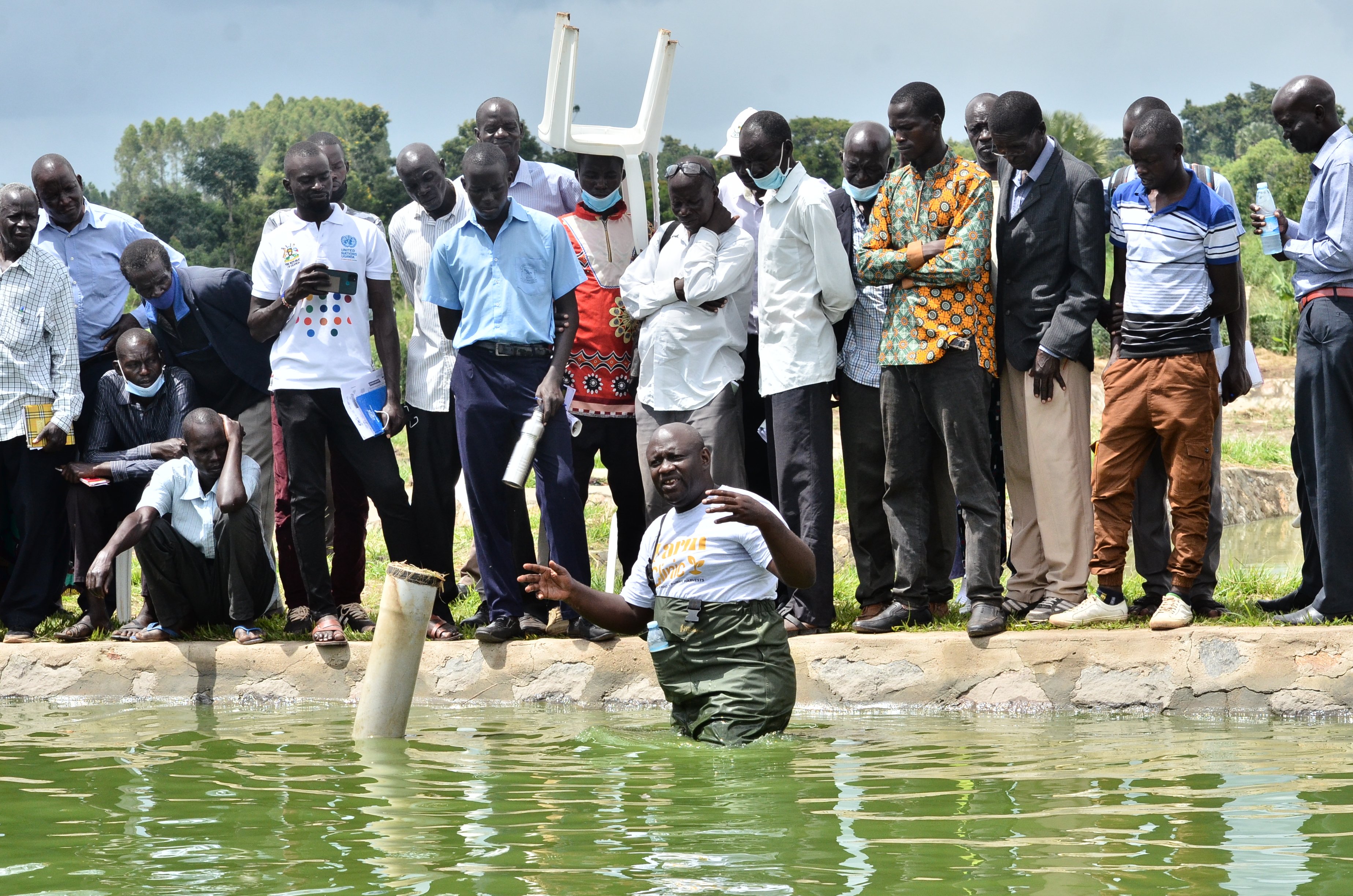
Farmers listen attentively as Naro experts explain the value chain of rice farming. PHOTOs/George Katongole
Seeds of Gold Farm Clinic
Where: Buginyanya Zardi, Bulambuli
Time: 7:30 am
Sponsors: Bank of Uganda, Stanbic Bank, Naro
As the world increasingly relies on processed foods, the importance of sustainable, productive farming cannot be overstated.
This Saturday, farmers from the South Eastern Agro-ecological Zone (U’SEAEZ) will converge at the Buginyanya Zonal Agricultural Research and Development Institute in Bulambuli District for a day of learning and practical experience at the Seeds of Gold Farm Clinic, an initiative of the Nation Media Group.
The Farm Clinic, now in its 37th edition, offers farmers a unique opportunity to interact directly with experts in agriculture, finance, insurance, and market linkages. Through hands-on demonstrations, farmers will gain valuable insights into boosting crop yields and profitability.
Joshua Jaafa Watwaluma, brand manager at Monitor Publications Limited, emphasises the Farm Clinic’s role in equipping farmers with the knowledge needed to adapt to climate change.
“We want to ensure farmers have the latest information to thrive in their farming operations,” he says.
This Saturday’s event will focus on maize, fish, sweet potatoes, soybeans, wheat, and barley, providing farmers with practical advice on cultivating these crops.
Thanks to the support of partners like Bank of Uganda, Heifer International Uganda, Stanbic Bank, Jubilee Insurance and Allianz, attendance is free.
A look at the host institute
Agriculture is the backbone of the South Eastern Agro-ecological Zone, with over 80 percent of households relying on it for their livelihoods. Farmers typically engage in mixed farming, combining crop cultivation with livestock rearing.
While staples such as maize, beans, bananas, and tomatoes are grown throughout the region, the higher elevations are better suited for crops such as Arabica coffee, wheat, barley, potatoes, and apples. In contrast, lower altitudes are optimal for Robusta coffee, cotton, groundnuts, rice, and cassava.
Interestingly, the traditional divide between food and cash crops has blurred as many food items now command high market prices.
Moreover, horticultural crops like onions, tomatoes, cabbages, and carrots are gaining popularity across all areas.
In addition to crop cultivation, livestock rearing, particularly poultry, goats, sheep, pigs, and cattle, is prevalent. Aquaculture, centred on Nile tilapia and African catfish, is also emerging as a viable livelihood option.

A trainer explains to farmers the best practices for Irish potatoe farming.
Major milestones
Buginyanya ZARDI is at the forefront of agricultural innovation, aiming to ensure food security in a region increasingly impacted by climate change.
The institute’s adaptive research is crucial in helping farmers cope with erratic weather patterns, shifting rainfall regimes, and rising temperatures.
BugiZARDI’s researchers are developing crop varieties that can withstand drought, floods, and pests commonly associated with climate change.
These new cultivars are bred to mature faster, yield more, and require fewer inputs, making them ideal for unpredictable weather conditions.
BugiZARDI has developed three new wheat varieties for the highlands, fortified with zinc and iron. These varieties are now ready for final testing.
A collaborative effort between Buginyanya ZARDI, the Ministry of Agriculture, Animal Industry, and Fisheries (Maaif), and Uganda Breweries Limited has resulted in the development of two promising barley varieties.
These new varieties have undergone rigorous testing across the country and have shown exceptional performance. The next step is to present them to the National Variety Release Committee for official recognition.
Researchers at Buginyanya ZARDI are evaluating maize varieties with enhanced protein content in the highlands of Kapchorwa, Kween, and Bukwo. Through a collaboration with Kilimo Trust, Buginyanya ZARDI has created vermicompost and is developing customized fertiliser mixes for maize, potatoes, and coffee.
During the 2023/2024 fiscal year, BugiZARDI achieved significant milestones in seed production. A total of 2.4 tonnes of maize (Longe 5D) and one tonne of beans (split equally between NARO Bean 1 and NABE 15) were produced.

A banana expert Sedrak Muhangi takes participants through different banana breeds during a recent farm clinic.
To bolster local seed industries, early generation seeds were distributed to businesses in Budaka, Bugiri, Bugweri, Iganga, Kaliro, Kamuli, Kibuku, Namutumba, Mayuge, Sironko, Kween, Kapchorwa and Bulambuli districts.
In addition to crop seeds, 200 bags of Sugar Napier were provided to support the restoration of the Mt. Elgon water sub-catchment. Furthermore, the institute prepared for future seed multiplication by bulking 0.8 tonnes of early generation wheat seed and 0.5 tonnes of early generation barley seed.
Buginyanya ZARDI demonstrated a new fish breeding technique using textile substrates to 34 farmers (20 men and 14 women) in Bugiri District. The focus was on breeding mirror carp and Nile tilapia.
Beyond developing new technologies, Buginyanya ZARDI is committed to knowledge sharing.
Farmers are involved in the research process, providing valuable insights into their challenges and needs. This is done through farmer field schools where researchers transfer knowledge and skills on climate-smart agriculture.
The institute established 10 farmer field schools across Buyende, Kamuli, Amuria, Katakwi, and Kaberamaido districts to raise awareness about the importance of agro-biodiversity in building resilience against climate change. Farmers in these regions identified priority crops, pastures, and tree species to focus on.
To accelerate the adoption of improved farming practices, the institute also set up demonstration farms showcasing successful maize and bean cultivation techniques.
These platforms enable farmers to learn about new crop varieties, soil management techniques, and disaster preparedness.




